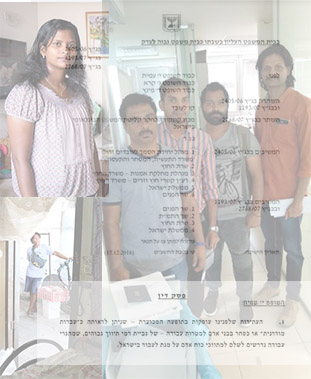“Modern slavery” and “human trafficking for labor purposes” were the words used by Supreme Court justices Amit, Karra and Mintz to describe the phenomenon of brokerage fees collection from migrant workers. They express a firm position regarding the government’s duty to fight the phenomenon in last week’s hearing regarding Kav Laoved’s petition.
***
Kav LaOved, together with the Concord Center and the Association for Civil Rights in Israel, is responsible for 12 years old petitions that demand the government to cease bringing migrant workers from states in which illegal brokerage fees are collected to Israel – and instead to insist on their bringing only through bilateral agreements. On Monday (17.12.18), the Supreme Court decided to remove the old petitions, after it became convinced the petition achieved its main goals and the government now acts to advance the common objective. The government requested to examine the accomplishments of the recently signed agreement with the Philippines, and to update according to the results.
The petitions were created in response to the phenomenon of brokerage fees collection of migrant workers (7000$-18,000$ per person), which enslaves them to loans granted by dubious bodies, exploitation and poverty. The faulty phenomenon is also responsible to the “revolving door” effect, which produces the interest of bringing more and more workers for brokerage fees and getting rid of those who already paid them, even if their debt is not yet covered.
The petitions have, without a doubt, generated a change in public consciousness regarding the phenomenon and the need to confront it – at the beginning the government wasn’t knowledgeable of the problem, but during the years of proceedings its stance shifted and many bodies, headed by the ministry of interior, became fierce proponents of the agreements. Thanks to the petitions, today most of the workers in the agriculture and construction sectors arrive to Israel from countries that maintain bilateral agreements with Israel – Thailand (in agriculture), Romania, Bulgaria, Moldova and People’s Republic of China (in construction) – and don’t pay brokerage fees. This group, estimated as 39,000 workers, will be joined by caregiving workers from the Philippines, who consists a third of caregiving workers in Israel.
Despite the government’s willingness to act for the agreements’ advancement and its recognition of their importance, the final word of the issue has not been said yet: firstly, brokerage fees continually rise, and the majority of migrant workers is not protected by agreements. Secondly, powerful entities strongly pressure authorities to breach the signed agreements and find ways to bring to Israel workers while avoiding the agreed guidelines. When the government does not clearly prioritize the bilateral course, and only “recommend” it or “examines” it – the message sinks in.
It is also important to remember the agreement with the Philippines has not been published yet. When it will be, we must examine it with a professional eye and measure its impact on the workers. It is just as important to promote worker protections in front of other countries, such as India, which was mentioned by the government during the hearing when it stated there are diplomatic difficulties in the advancement of bilateral agreements with it (thousands of migrant workers from India, brought through various courses, are harmed by criminals and pay enormous amounts). We meet exploited Indian workers who tell us their difficult stories every week, and we will continue fighting for them and for their friends, for protection and regularization of arrival – every way we can.
You can read more about the issue (in Hebrew) in Bini Aschkenasy‘s TheMarker article: https://www.themarker.com/law/.premium-1.6761139…
Or in Nizan Zvi Cohen‘s Davar Rishon article: https://www.davar1.co.il/165066/…
24-12-2018


